DIM LIGHTS
As part of its 17th Annual Pacific Playwrights Festival, South Coast Repertory presented a play by Adam Rapp. Unlike Theresa Rebeck’s Zealot and Rajiv Joseph’s Mr. Wolf, which received staged readings last weekend, Mr. Rapp’s The Purple Lights of Joppa Illinois, read once at SCR’s NewSCRipts series last December, was given a fully staged production with the golden 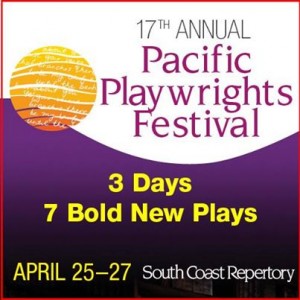 promotion stamp of “World Premiere.” As if to elucidate Rapp’s controversial and often wonky playwriting style (more on that later), SCR decided to offer a prestigious slot to this prolific, New York-centric playwright whose name is tagged with “Pulitzer Finalist.” More disturbing than the result (more on that later, too) is that SCR apparently has no scripts available from unknown writers that they see fit to produce at a Playwrights Festival. While this prestigious regional theater has always been at the forefront of developing new works, it has fallen into a trap of commissioning and producing plays by well-known, well-connected writers who still ain’t all that’”those who continually show promise year after year without developing into truly mature storytellers.
promotion stamp of “World Premiere.” As if to elucidate Rapp’s controversial and often wonky playwriting style (more on that later), SCR decided to offer a prestigious slot to this prolific, New York-centric playwright whose name is tagged with “Pulitzer Finalist.” More disturbing than the result (more on that later, too) is that SCR apparently has no scripts available from unknown writers that they see fit to produce at a Playwrights Festival. While this prestigious regional theater has always been at the forefront of developing new works, it has fallen into a trap of commissioning and producing plays by well-known, well-connected writers who still ain’t all that’”those who continually show promise year after year without developing into truly mature storytellers.
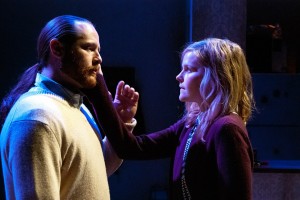 Samuel D. Hunter comes to mind. As with many of his contemporaries, Hunter (the Obie-winning A Bright New Boise, The Whale) has an agreeable knack for exposing his characters’ nuances through true-to-life dialogue, but the set-ups nearly consistently fail to follow through. No doubt he has struck a chord because he peers into the lives of small-town folk (usually one of whom is gay), creating empathy for those whose existence is dictated by their circumstances (and it’s always in Idaho). He examines the seemingly trivial everyday people who are rarely portrayed in the theater, and it is most welcoming. But much of his dramatic action occurs offstage and his simplistic construction lacks an arc. His strengths and weaknesses continue to appear in play after play, and he shows no sign of improving.
Samuel D. Hunter comes to mind. As with many of his contemporaries, Hunter (the Obie-winning A Bright New Boise, The Whale) has an agreeable knack for exposing his characters’ nuances through true-to-life dialogue, but the set-ups nearly consistently fail to follow through. No doubt he has struck a chord because he peers into the lives of small-town folk (usually one of whom is gay), creating empathy for those whose existence is dictated by their circumstances (and it’s always in Idaho). He examines the seemingly trivial everyday people who are rarely portrayed in the theater, and it is most welcoming. But much of his dramatic action occurs offstage and his simplistic construction lacks an arc. His strengths and weaknesses continue to appear in play after play, and he shows no sign of improving.
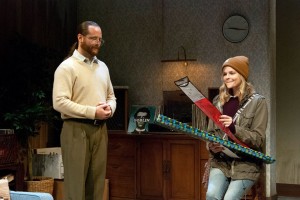 What gets me rankled is that Hunter has become a Golden Boy in the theater, and three World Premieres popped up within months of each other: The Few at The Old Globe (last October, soon to play at Rattlestick), A Great Wilderness at Seattle Repertory Theatre (last January), and Rest at South Coast Rep (closed last week). Of the latter, the Los Angeles Times’ critic Charles McNulty ended a glowing review with, “It’s in these almost incidental moments that Rest attains its dramatic heights. Hunter is still working out a playwriting method for his questing secular-spiritual vision. Let’s hope that the theater can hold on to him long enough for him to figure it out.” I’ll take that to read: With no “next great playwright” on the horizon, Hunter shall be encouraged, not discouraged; audiences should pay to watch a playwright in development; and yours truly will get bored giving the same opinions over and over.
What gets me rankled is that Hunter has become a Golden Boy in the theater, and three World Premieres popped up within months of each other: The Few at The Old Globe (last October, soon to play at Rattlestick), A Great Wilderness at Seattle Repertory Theatre (last January), and Rest at South Coast Rep (closed last week). Of the latter, the Los Angeles Times’ critic Charles McNulty ended a glowing review with, “It’s in these almost incidental moments that Rest attains its dramatic heights. Hunter is still working out a playwriting method for his questing secular-spiritual vision. Let’s hope that the theater can hold on to him long enough for him to figure it out.” I’ll take that to read: With no “next great playwright” on the horizon, Hunter shall be encouraged, not discouraged; audiences should pay to watch a playwright in development; and yours truly will get bored giving the same opinions over and over.
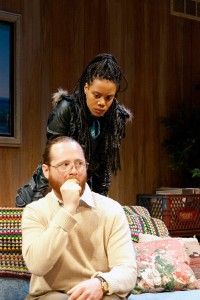 This is the world of American playwriting: In an internet-dominated culture where promotion more than quality is the key to success, anyone who has won an award or whose work has been professionally produced is automatically honored the Willy Wonka Golden Ticket to be first in line to have their new plays staged. I have a very strong hunch that The Purple Lights of Joppa Illinois would never have been green-lighted without Rapp’s name attached to it. And who is making these choices? Is it SCR’s new Artistic Director Marc Masterson? (As AD at Actors Theatre of Louisville, he premiered two of Rapp’s plays’”Finer Noble Gases (2002) and The Edge of Our Bodies (2011)’”in the Humana Festival of New American Plays). Is it resident dramaturge and Literary Director Kelly L. Miller? Or are there simply reams of bad scripts out there, forcing the powers that be simply to go with the best-known name?
This is the world of American playwriting: In an internet-dominated culture where promotion more than quality is the key to success, anyone who has won an award or whose work has been professionally produced is automatically honored the Willy Wonka Golden Ticket to be first in line to have their new plays staged. I have a very strong hunch that The Purple Lights of Joppa Illinois would never have been green-lighted without Rapp’s name attached to it. And who is making these choices? Is it SCR’s new Artistic Director Marc Masterson? (As AD at Actors Theatre of Louisville, he premiered two of Rapp’s plays’”Finer Noble Gases (2002) and The Edge of Our Bodies (2011)’”in the Humana Festival of New American Plays). Is it resident dramaturge and Literary Director Kelly L. Miller? Or are there simply reams of bad scripts out there, forcing the powers that be simply to go with the best-known name?
Equally troubling is that playwrights are churning out works containing elements which make them more likely to be produced within the current theatrical landscape, one which appears to be dominated more by the bottom line than by art. Therefore, the majority of new plays include small casts, one set, and run 90 minutes or so with no intermission.
Who is Adam Rapp? Except for New Yorkers and in-the-know theater folk elsewhere, few are likely to be able to place his name. Rapp (brother of actor Anthony Rapp of Rent fame) is easily one of the most contentious subjects among 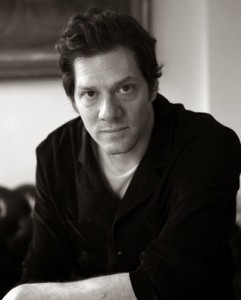 critics and playgoers, both detractors and fans who are divided between bewildered consternation and passionate excitement. Yet major New York theater companies (and now SCR) continue to produce and commission his work, which he almost always directs himself.
critics and playgoers, both detractors and fans who are divided between bewildered consternation and passionate excitement. Yet major New York theater companies (and now SCR) continue to produce and commission his work, which he almost always directs himself.
To his credit, Rapp’s works can be wholly original: When seeing one of his plays, I have yet to think that he is recycling other playwrights. He authors terrific lines with dark humor even though his self-conscious poetic dialogue can be incongruous with the character. He writes with conviction, creating delicious roles that’”while their existence often challenges reason’”become showcases for great actors. He can be extraordinarily funny and urgent. And he seems to continually reinvent himself even though he forever has the same structural issues.
 The problem (and I’ll never understand how this has become acceptable) is his narrative: He doesn’t know what to do with the peculiar people and surreal episodes he creates, so all the sensationalism in the world can’t disguise that there’s a paucity of emotional truth and universality necessary to make his plays timeless. All the unique circumstances and characters in the world will fade from memory when we are not connected to the story. For all that I’ve seen and read, his plays don’t have a strong reason to exist, and therefore can come off as indulgent. This, I believe, is why his works have become so polarizing. As with so much American culture, he starts out fascinating and promising, but ends up alienating, frustrating, unfulfilling, numbing, or disposable. But apparently a nettlesome playwright is a producible playwright’”need I mention Mamet or LaBute?
The problem (and I’ll never understand how this has become acceptable) is his narrative: He doesn’t know what to do with the peculiar people and surreal episodes he creates, so all the sensationalism in the world can’t disguise that there’s a paucity of emotional truth and universality necessary to make his plays timeless. All the unique circumstances and characters in the world will fade from memory when we are not connected to the story. For all that I’ve seen and read, his plays don’t have a strong reason to exist, and therefore can come off as indulgent. This, I believe, is why his works have become so polarizing. As with so much American culture, he starts out fascinating and promising, but ends up alienating, frustrating, unfulfilling, numbing, or disposable. But apparently a nettlesome playwright is a producible playwright’”need I mention Mamet or LaBute?
 As editor-in-chief, I receive thousands of invites a year to review plays. Correct me if I’m wrong, but of Rapp’s 30 (or so) plays since the late 90s, I only know of just a few produced in the States outside of New York and Chicago. L.A. has seen Ghosts in the Cottonwoods at 24th Street Theatre in 2000, Blackbird at Elephant Theatre Lab in 2009 (not to be confused with David Harrower’s amazing Blackbird at Rogue Machine), and Nocturne at The Other Space in 2014. If Rapp is so great that he gets a commission and then a full production (albeit a short run) after one read, why aren’t his plays produced more often?
As editor-in-chief, I receive thousands of invites a year to review plays. Correct me if I’m wrong, but of Rapp’s 30 (or so) plays since the late 90s, I only know of just a few produced in the States outside of New York and Chicago. L.A. has seen Ghosts in the Cottonwoods at 24th Street Theatre in 2000, Blackbird at Elephant Theatre Lab in 2009 (not to be confused with David Harrower’s amazing Blackbird at Rogue Machine), and Nocturne at The Other Space in 2014. If Rapp is so great that he gets a commission and then a full production (albeit a short run) after one read, why aren’t his plays produced more often?
I certainly haven’t seen as much as has The New York Times’ Charles Isherwood, who after ten years of basically panning him, asked his editor in 2011 to be recused from ever having to review Rapp’s plays again. (Oh, but that’s a provocative and thorny issue for another article.)
* * * * * * * *
As for The Purple Lights of Joppa Illinois, the set-up, extraordinary characters, and interesting situation end up inconsequential and unbelievable.
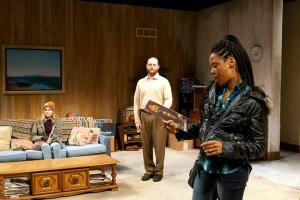 The story concerns Ellis Shook, who suffers from bi-polar affective disorder with psychosis. After accidentally killing a child, he has been released from psychiatric incarceration and now lives in Paducah, Kentucky. He has located his long-estranged 13-year-old daughter, Catherine, who arrives frail and pallid at his squalid apartment with her black, sassy, foulmouthed, highly educated best friend, 16-year-old Monique. The “Purple Lights” reference is obscure, but the teenagers arrived from “Joppa Illinois,” 20 miles northwest.
The story concerns Ellis Shook, who suffers from bi-polar affective disorder with psychosis. After accidentally killing a child, he has been released from psychiatric incarceration and now lives in Paducah, Kentucky. He has located his long-estranged 13-year-old daughter, Catherine, who arrives frail and pallid at his squalid apartment with her black, sassy, foulmouthed, highly educated best friend, 16-year-old Monique. The “Purple Lights” reference is obscure, but the teenagers arrived from “Joppa Illinois,” 20 miles northwest.
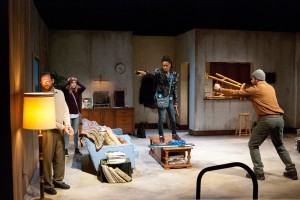 It’s really a very small play stretched out to 85 very long minutes. Once the uncomfortable introductions are over (which admittedly contains some uproarious if wholly implausible dialogue from Monique’”the only reason this character exists), we get the kernel of the play: Catherine, who never knew her father, is there for money to enter art school, so she and Ellis try to decipher how to relate to each other while Monique hides out in the bedroom. There’s plenty of filler but no dramatic incident until Ellis’ nurse, Barrett, suddenly arrives. Ellis begins to freak out, so Monique panics and strikes him with a taser gun. While Ellis lies on the floor recovering, the girls get the backstory about the murdered child from Barrett (the only reason that character exists). Ellis gets up. He and Catherine quickly bond in a hyper-sentimental way. End of play.
It’s really a very small play stretched out to 85 very long minutes. Once the uncomfortable introductions are over (which admittedly contains some uproarious if wholly implausible dialogue from Monique’”the only reason this character exists), we get the kernel of the play: Catherine, who never knew her father, is there for money to enter art school, so she and Ellis try to decipher how to relate to each other while Monique hides out in the bedroom. There’s plenty of filler but no dramatic incident until Ellis’ nurse, Barrett, suddenly arrives. Ellis begins to freak out, so Monique panics and strikes him with a taser gun. While Ellis lies on the floor recovering, the girls get the backstory about the murdered child from Barrett (the only reason that character exists). Ellis gets up. He and Catherine quickly bond in a hyper-sentimental way. End of play.
There isn’t one thing previously mentioned’”good and bad’”about Rapp’s plays that didn’t show up on stage at the tiny Nicholas Studio at SCR, but this time it came with a patina of immaturity. I must admit that the slick cadence-filled dialogue often distracted from the lousy structure: Monique: “I AM CALM! DO I NOT SEEM CALM TO YOU? I’M AS CALM AS A MOTHERFUCKIN UNICORN SMOKIN WEED ON TOP OF A RAINBOW!”
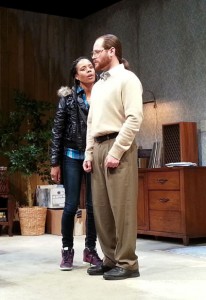 Crispin Whittel’s direction is deliberate, but he called forth some lovely nuances from his game cast, who were all at the mercy of repetitive information, one-note dialogue, elliptical conversations, and extraordinarily unsympathetic characters.
Crispin Whittel’s direction is deliberate, but he called forth some lovely nuances from his game cast, who were all at the mercy of repetitive information, one-note dialogue, elliptical conversations, and extraordinarily unsympathetic characters.
A clue that Rapp wrote this trifle for himself to direct arrives early in the play: Monique scrounges through Ellis’ records and pulls out a Mickey Newbury album. As the three listen to the entire cut of “I Don’t Think About Her Much No More,” nothing of interest occurs’”their removed reaction reveals so little about them that we are taken out of the moment, not pulled into it. In addition, the obvious symmetry of the song’s lyrics to the situation is almost insulting: “I don’t think much about her no more / And seldom if ever does she cross my mind / Yesterday’s gone, Lord, it’s better forgotten / Like the poison red berries to die on the vine.” What would Rapp have done to improve this deadly moment had he directed it? Rapp did, however, cast the play. Coincidentally, I noticed that actor Connor Barrett, who has worked with Rapp before, played the role of the nurse, Barrett.
* * * * * * * *
Yes, I understand that theater companies nationwide are holding playwright festivals and giving plenty of new works a shot, but rare is the thrilling new American play. Of the hundreds I have seen in the last few years, few show merit, and even fewer are truly exciting. Until something profoundly shifts, the Hunters and Rapps hold the cards. More fearsome for me is that these will be the plays produced by professional companies and then community players until the end of my days.
Rapp inserted a poem into the program by Zachary Schomburg about a man searching for his girl. It ends with, “A tiny cake is drying on a tiny table.” That about sums up the state of American Playwriting.
[Stage and Cinema’s reviews of Rapp plays in NYC: The Flea’s Bingo and the Indians (2007), Atlantic Theater Company’s Dreams of Flying Dreams of Falling (2011), and Rattlestick’s Through the Yellow Hour (2012).]
photos by Tania Thompson/SCR
The Purple Lights of Joppa Illinois
part of South Coast Repertory’s 17th Pacific Playwrights Festival
Nicholas Studio at South Coast Rep
655 Town Center Drive in Costa Mesa
scheduled to end on May 4, 2014
for tickets, visit www.scr.org
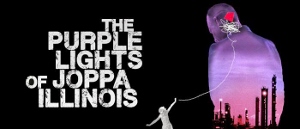
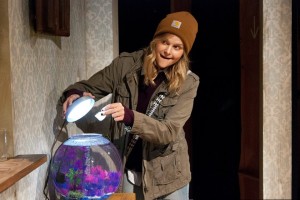

{ 4 comments… read them below or add one }
I have read your analysis of playwriting today, and unfortunately you are correct. I think you have identified the major problems:
1) Playwrights who want to be produced are writing 90-minute plays with small casts. This means that either they cannot really explore the subject or they pick a subject so narrow and specific that it really isn’t very interesting.
2) Then they pick certain subjects because the powers that be are either interested in these subjects themselves or think the public is interested in these subjects: small-town, bigoted America vs. the cosmopolitan city folk, dysfunctional families, dysfunctional relationships, anything about sex – but gay is best, America’s nasty role in the world, and of course you get special points for being Irish or British.
3) Also a lot of playwrights (some of whom are actors or former actors) can write good scenes but have no idea how to structure a beginning, middle and end to a play.
4) Playwrights who know how to promote themselves get produced over playwrights who know how to write – the number of awards a playwright has won is often an indication of how bad his or her plays will be.
5) Playwrights who attend a prestigious writing program are pushed by their teachers who know the right people.
6) Playwrights who are still learning their craft are hailed as geniuses immediately, so they never have to improve. In fact they can continue to write quirky garbage with the guarantee that they will get good reviews. Annie Baker comes to mind. Her last play, The Flick was by all accounts way too long, according to some critics as much as one hour too long. Yet they said it was wonderful. I cannot imagine how sitting through a three-hour play that should really be two hours can be a wonderful experience.
I don’t know why we have lost the ability to produce good playwrights. I think part of it (in NYC) has to do with the uptown/downtown split. On Broadway it’s all about money, and to make money producers need a big name and a recognizable title. So they redo a movie and get one or two big stars. Downtown it’s all about intellectual pretense, so they get a play that no one understands. The critics interpret it as genius and everyone goes along because no one wants to appear stupid. That’s one interpretation. The other is that we just keep getting dumber. Either explanation is depressing.
Paul, A New York Reader
Regarding Annie Baker, Paul: This from the Los Angeles Times on April 14, 2014: “Annie Baker’s The Flick — a highly divisive drama that prompted an abundance of head-scratching and some audience walkouts during its off-Broadway run last year — has won the 2014 Pulitzer Prize for drama.”
Dear Tony:
I ABSOLUTELY LOVED your piece on the state of the theater. I have banged my head against the wall, trying to understand how this small group of playwrights seem to dominate these theaters OVER and OVER and OVER again. Your piece was like someone opened the window and let some fresh air in. THANK YOU!
Having said that, I am a (young) playwright who wants to submit to these theaters, but fear that no one is going to give a rat’s ass about the play because I haven’t won any such-and-such award. Where do these awards come from? And more importantly, WHO CARES?!
Thank you, again, for opening that window.
Best wishes –
Michael
Just saw this play 6/5/16 in NYC. You have described this and the writer with such eloquence. This was a very long 90 minutes. I didn’t care about the actors, acting, characters or writing. Listening to the full song by Mickey Newbury was maddening! Why??? I saw no value in this play. Someone in the first row walked out early on. I was in the last, which made it impossible.
On the other hand, I am not in agreement about Hunter. I saw The Whale two years ago, and to this day it resonates with me. I am looking forward to seeing his The Healing soon.